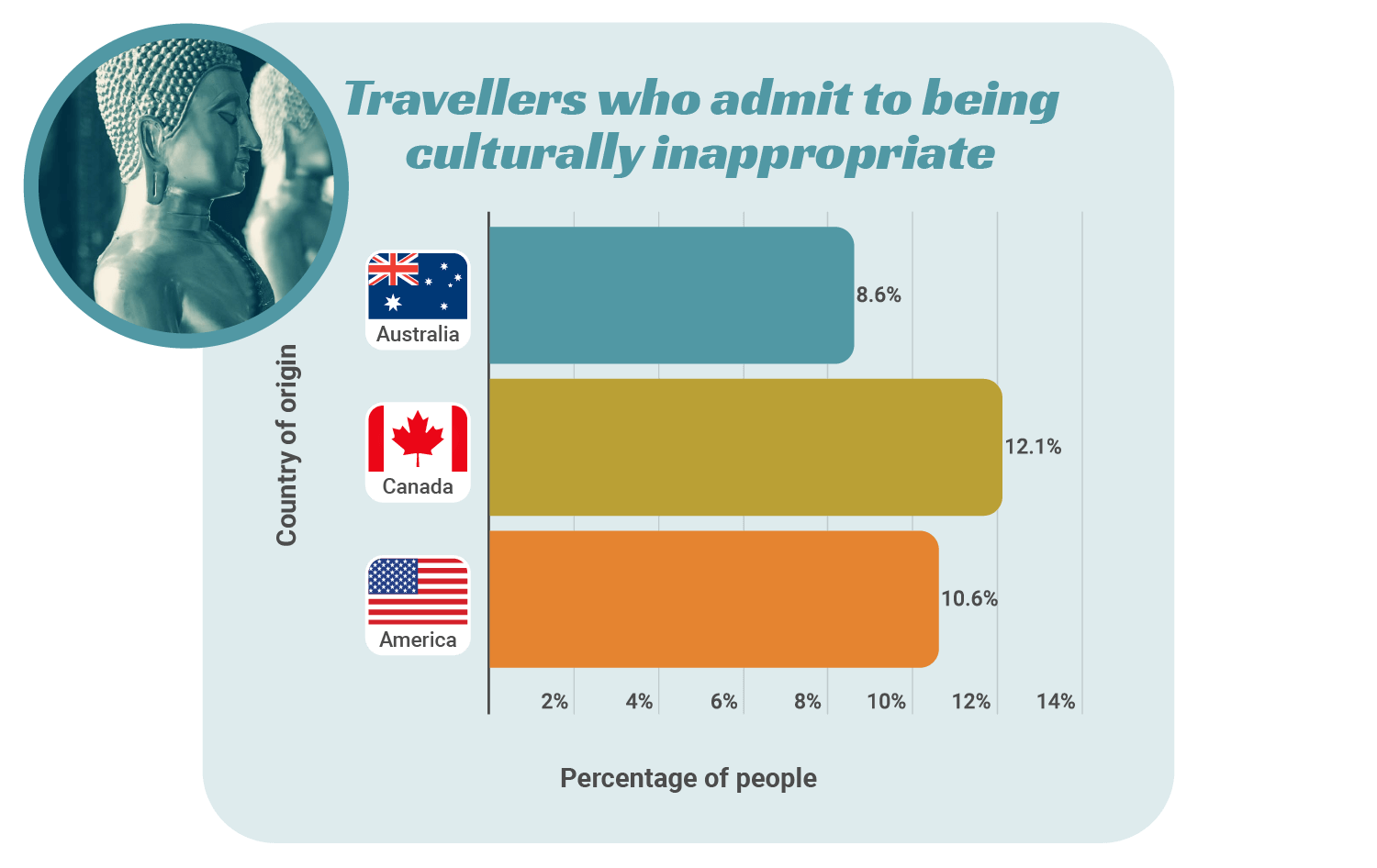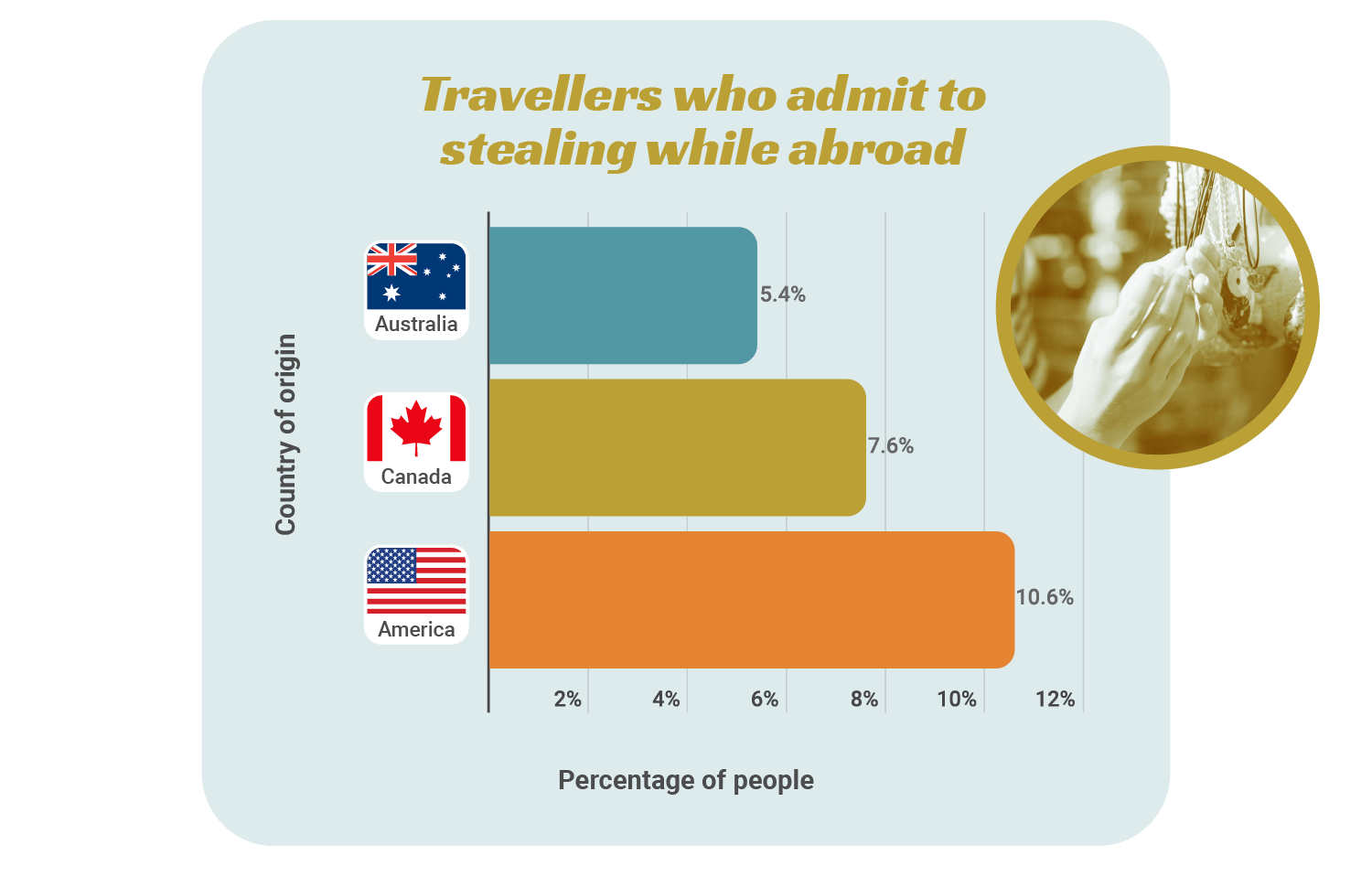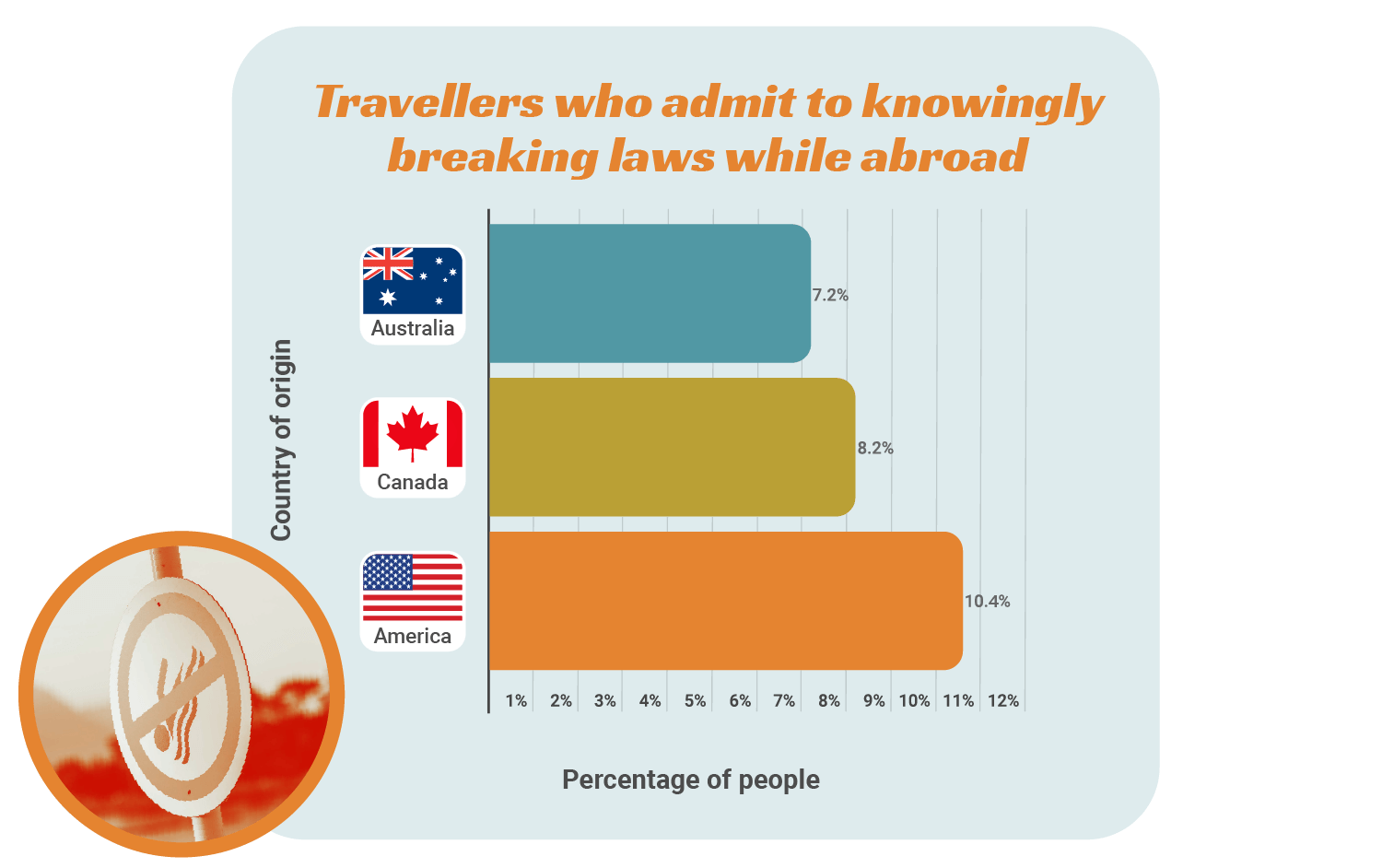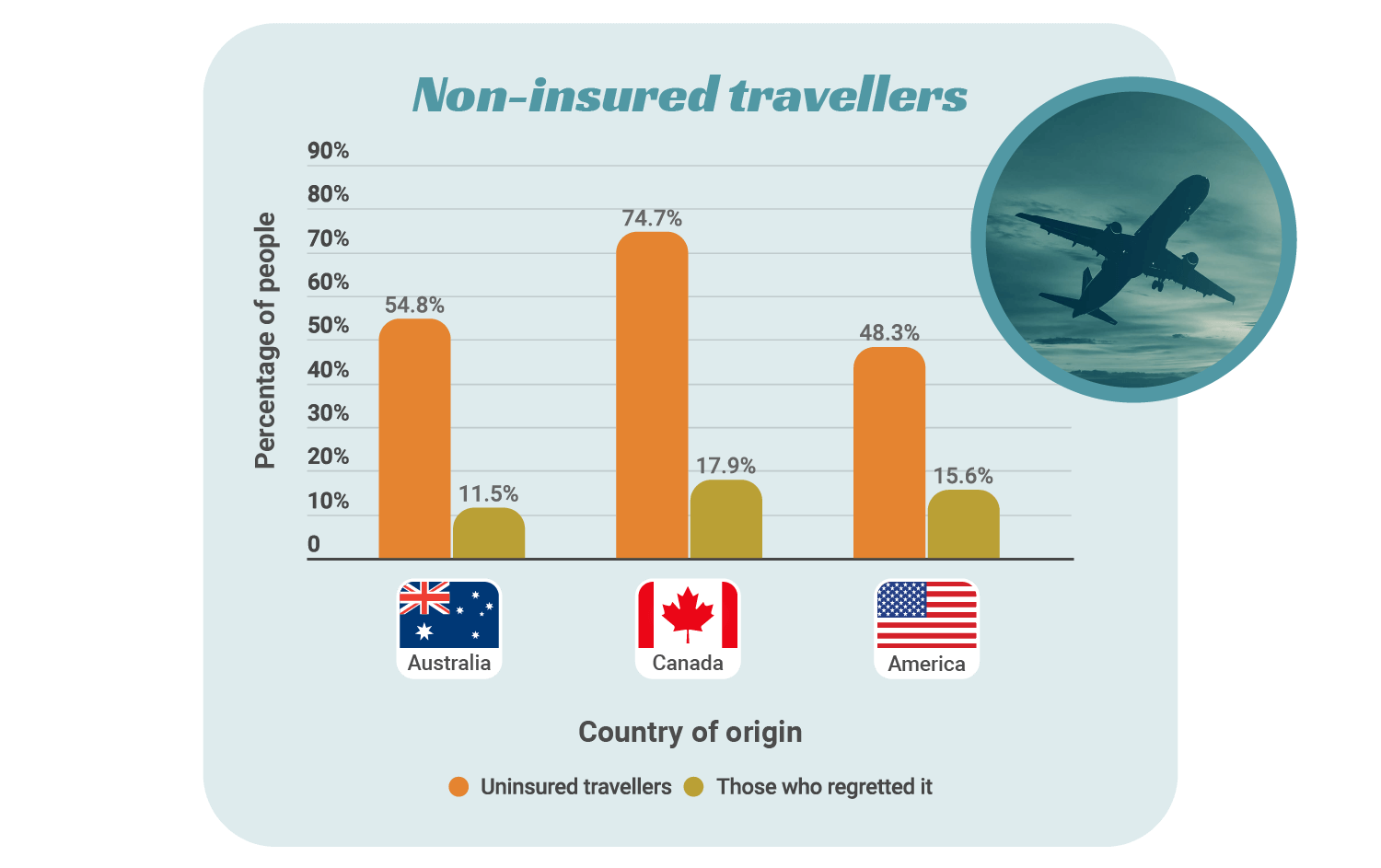The Burrow

Hell-raising holidaymakers have confessed to crimes and culturally offensive obscenities, as part of a new study by Compare the Market about how travellers behave abroad.
The survey of 2,500 adults across Australia, America and Canada found a surprisingly high number had disrespected local rules and customs while on vacation.
The findings are a timely reminder of travel etiquette, as people pack for post-pandemic holidays.
Whether you’re letting your hair down in Harajuku or Honolulu, breaking the law can land you in hot water.
The results reveal that Americans were the worst behaved of all three nations, with the highest figures for stealing, cultural misbehaviour or other forms of lawbreaking. Australians were continuously the most well-behaved, followed by Canada in second place.
The following groups were the worst offenders while travelling abroad:
Those aged 55 and older were the most respectful age group across the entire study.
When it comes to specific misdemeanours while travelling, the most common was acting culturally inappropriate. As many as one in ten (10.6%) Americans, 12.1% of Canadians and 8.6% of Australians have admitted to engaging in behaviour that would be deemed culturally insensitive to their destination.

The worst culprits of culturally inappropriate behaviour while abroad were as follows:
Men were also considerably more likely than women to engage in culturally inappropriate behaviour. It was most extreme in the States, where more than twice as many males admitted to doing so than females.
Forget being pickpocketed in an unfamiliar marketplace – did you know that more than 10% of the population has admitted to stealing from another person, vendor or business while overseas?
Americans had the stickiest fingers, with as many as 10.6% of the nation confessing to some form of theft while they were a tourist.
That’s almost twice as many as Australia, at just 5.4%. Canadians were somewhere between good cop and bad cop, with a travelling theft rate of 7.6%.

As it was for the previous statistic, men were more likely to steal while travelling than women were in all three countries.
The results were relatively consistent across age groups, too. Adults between 25 and 34 repeatedly appeared at the top of the list for worst offenders in this category. In fact, nearly one-quarter of young American millennials (aged 25-34) confessed to robbery while abroad. Compared to those 55 and older, where only 3.4% revealed as much (on average), it’s a stark difference.
It can be tough to keep abreast of intricate and unfamiliar laws in any given country; however, most tourists do their due diligence to understand the rules they must conform to before visiting a region. Unfortunately, that’s not the case for all travellers.
One in ten American travellers revealed they have intentionally broken the law at a vacation destination. The figure is slightly smaller in Canada (8.2%) and Australia (7.2%).

As with the previous statistics, men were more likely than women to have knowingly broken laws at an international destination. In fact, men in North America were more than twice as likely!
Men were more likely than women to have knowingly broken laws at an international destination. In fact, men in North America were more than twice as likely!
Millennials were once again the most rebellious demographic. Almost one-quarter of Americans and 15% of Canadians aged 25-34 admitted to lawbreaking, which was a more significant percentage than any other age group. In Australia, the most prominent group was 35-44-year-olds, at 13%.
It’s one thing to steal from someone else while travelling, but what about those who find their own belongings have gone amiss? In those instances, travel insurance can be invaluable.
As many as 75% of Americans, 55% of Australians and 48% of Canadians have travelled without insurance.
Most commonly, it’s men who go without – but only by a small majority. Between 52% and 58% of uninsured travellers in all three countries are males.
As for age, Canadians and Australian adults between 35 and 44 would be the most likely to travel without cover, represented by 57% and 66% of the groups, respectively. However, in the States, that number soars to 84% for 55-64-year-olds.
But is it commonly regretted? Our results revealed that between one in ten and one in five nomads without travel insurance came to regret their decision, Canadians more so than any others.

After all that talk of millennials being the worst behaved tourists, they also shone through as the group most likely to regret not having insurance to cover them while travelling. More than a third (35%) of those aged 25-34 claimed as much in the US, followed by 26% of Canadians saying the same.
With all this being said, it’s important to note that even if you do have travel insurance, your claim will likely not be paid if you suffer a loss while doing something unlawful.
Compare the Market’s travel insurance expert, Stephen Zeller, talks about the importance of being adequately insured when on an overseas trip.
“While travelling, it’s not unlikely for things to go amiss, including theft or loss of property, cancellation of flights or other disruptions,” Mr Zeller explained.
“Having the right level of travel insurance can help ease the financial burden that comes with a change of plans or sudden emergency.
“Our research shows that as many as one in five people have regretted their decision to forgo travel insurance, and if they had their time over, they would have booked it prior to their holiday departure.
“Before you set off on an overseas journey, make sure you do your research to understand the risks involved at your destination and find a level of cover that will be best suited to your journey.”
Compare the market commissioned Pure Profile to survey 502 Australian, 1,000 American and 1,005 Canadians adults in April 2022.
If you’re planning your next trip away and are unsure what level of cover you may need, consider using Compare the Market’s free travel insurance comparison tool. It can help you understand the needs of your destination and make sure you are covered in the event of an injury, lost or stolen goods, and trip cancellation – depending on your level of cover.
